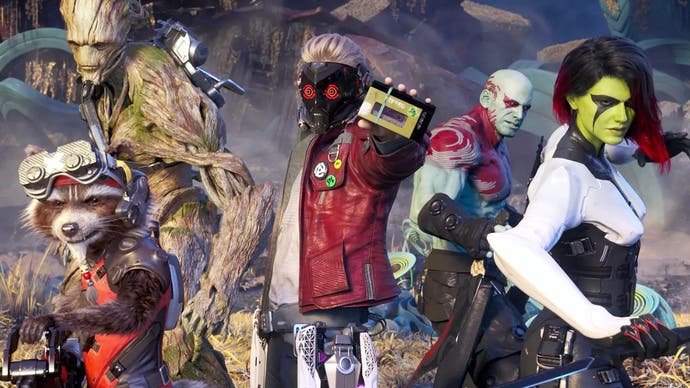Guardians of the Galaxy developer addresses Square Enix sales expectations, how it wanted to create a new Marvel IP
"I have no regrets. We did everything we could."
Last year, Eidos Montreal released Marvel's Guardians of the Galaxy - its own, original take on Marvel's oddball spacefaring family - to largely positive reviews which praised its single-player focus, character work and humour. But it remained unclear how well the game had performed commercially, and in February, publisher Square Enix said the title had "undershot expectations".
Ahead of the BAFTA video game awards last night, I sat down with members of the Guardians of the Galaxy team to discuss the game's emotional storytelling, where the series could go next - and some unexpected tussles with racoons.
But first, the issue of those sales - on which, the team said it had "no regrets".
"I think it's a great ride. It's emotional. It has a lot of qualities," said Guardians of the Galaxy senior creative director Jean-Francois Dugas. "Is the game perfect? Like any game, no, I don't think it's perfect. It can always be better.
"But is it a great ride? And is it something this year or last year that you played that is unlike everything else? And is it worth spending your time on? I honestly think it is, from a game standpoint."
Dugas continued: "I have no regrets. We did everything we could but that's the reality of the market... And let's not forget it's a new IP. Even though we say all 'Guardians [of the Galaxy] are known', it's still a new IP [in the video game market]. It could be a lot of people don't even know that the game is out yet, or they're not sure exactly what it is."
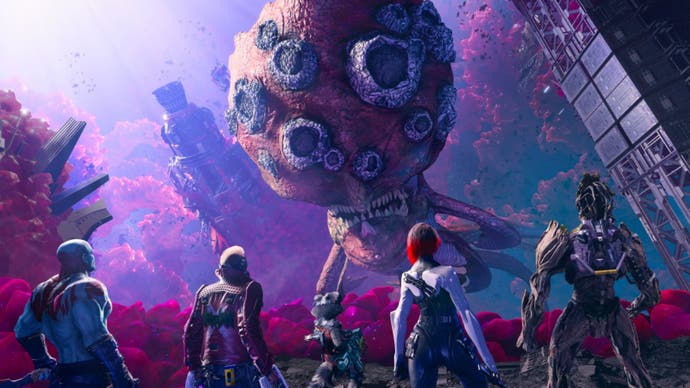
But thanks to word of mouth and its arrival on Xbox Games Pass, Dugas now feels the game is doing well.
"It's like anything. We always want to sell trillions but it's not always necessarily as easy as that," he laughed.
This is something senior narrative director Mary DeMarle echoed.
"For me, it's all about creating the game," she said. "What I love right now is that people, especially with Games Pass, are playing it and they're sharing the experience.
"We make games to touch people, we make games to hit an audience. And it's great that it's finding its audience, and it's great that it keeps going forward."
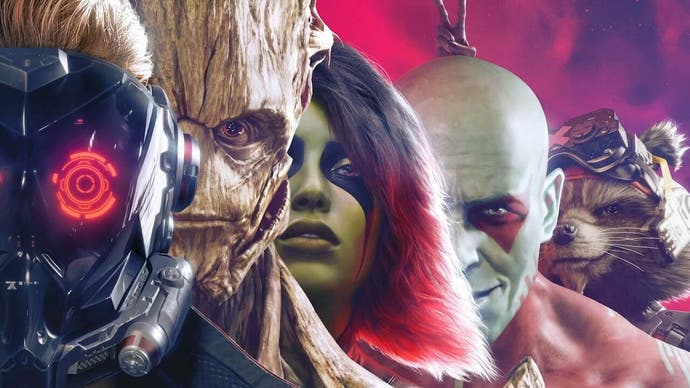
But could "forward" still mean "sequel"? On this, the team was keen not to rule anything out.
"Right now, we're not talking about the future," Dugas said, "because every time we close a project, that's a time to pull down, wrap up and take some vacations. So, I guess we'll know in the future months or years what we're going to work on next, so we'll see.
"Never say never, and never say anything," he joked.
When asked where he would personally like to see the characters go next, Dugas did say he "has ideas", but what these ideas are remains a mystery.
Meanwhile, DeMarle was equally coy. "I don't like to give anything away for the future," she dodged.
"I will say that, working on the game, these characters became very dear to me and to the writing team. And we were sad to say goodbye when they were finished. But you know, now we're seeing what happens out there in the world."
The team also chatted about the challenges of moving away from the shadow of the MCU, where the name Star-Lord immediately evokes Chris Pratt wielding his Quad Blasters with Bradley Cooper's voice as Rocket and Zoe Saldaña's Gamora by his side.
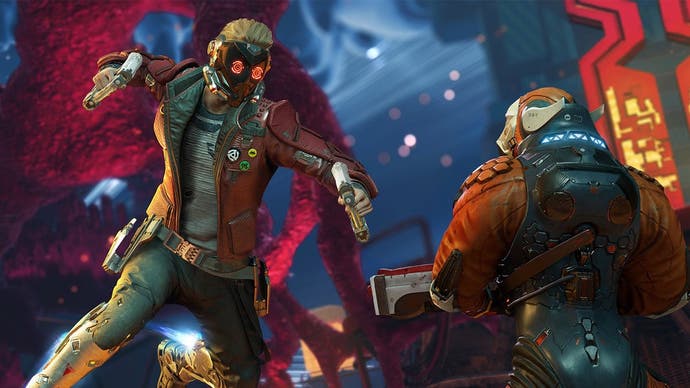
"I think there was a little bit of an inherited amount of pressure knowing how big the MCU is," said Jon McLaren, the actor behind the game's version of Star-Lord. "We were told very early on in the process that this was to be a unique story, and a new take on the characters. It was to be separate from the MCU and separate from the comics."
DeMarle said this was all done by simply coming back to the heart of the characters.
"Marvel was really supportive of that," DeMarle said. "When we met with them in LA for the first time to talk about the game and what we were going to be able to do with it, they were very clear.
"They said, 'We want you to create your version of the Guardians. Make sure that the essence of these characters remains the same. But you can create your own backstories you can make your own looks for them and everything.'"
To come up with these new backstories and unique versions of Peter Quill and co, the team delved into Marvel's history.
"The first thing we did as a team was immerse ourselves in everything Guardians. So obviously, we'd seen the movies and we watched them again. And then we read tons and tons of comics [thus the Guardians' expletive "Flark!" came to be], and even looked at the anime television show series," explained DeMarle.
"We started to see that every single incarnation of [Guardians of the Galaxy] has a core. The characters each have a core to their being, but yet they're all different."
Spoiler Warning: The remainder of this article touches on story elements you may prefer not to know if you're still yet to play Guardians of the Galaxy.
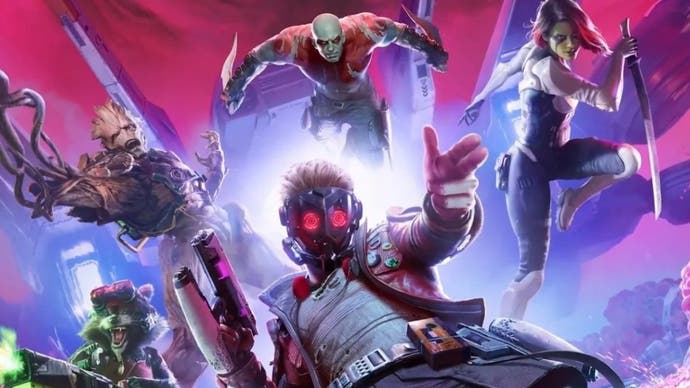
After brainstorming about locations and set pieces, the team eventually settled on basing their new game around the Galactic War theme. This allowed the writers to delve into the struggles of the galaxy after the War and lent itself nicely to the characters' personal growth.
After all, despite Guardians of the Galaxy being a fun game, full of humour and colourful set pieces at every turn, there is a constant underscore of grief laced throughout its narrative.
Those who know the Marvel universe know that Peter Quill loses his mother at a young age, and this is something the narrative team really wanted to develop further.
"One of the biggest things in this game is the theme of grief and loss. And it's about redefining family and finding a new family," said McLaren.
"The grief aspect of this is a very important part of the game... We did a lot of reading on grief and the right ways to approach people who are grieving," reiterated DeMarle.
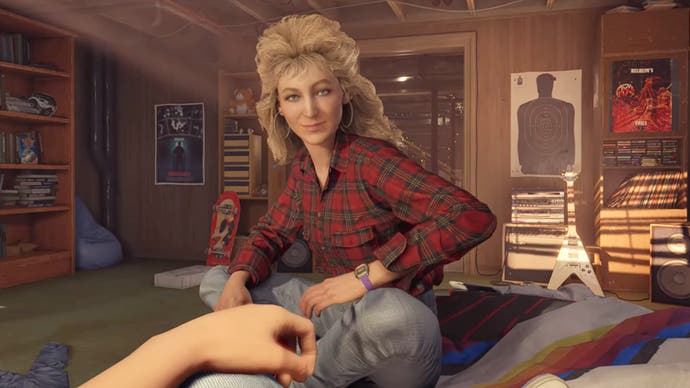
"The flashbacks with [Meredith Quill, Star-Lord's mother] build Peter's character. We know you don't get a lot of time with Meredith, but we still need you to know right away she's super important to him.
"So, we have to make her the 'cool mum' that you love in that short time you have with her, because it's essential to the story. This then bridges Peter's character, because in the future, it's the relationship with his mother and the trauma [of losing her] that prevents him from growing up.
"Then, when you're in the future with [the Guardians], you can play with the comedy of the team as part of that character as well, and say, 'Yeah, this is how they are, and this is how they deal with life because of their past and because of their tragedies'."
Star-Lord's story almost comes full circle by the end of Guardians of the Galaxy, with 12-year-old former Nova cadet-in-training Nicolette 'Nikki' Gold joining the team. With her now on board the Milano, Star-Lord has to set himself up to become a father figure to this young charge.
When asked how he felt Star-Lord would do in his new parental role, and with the Guardians as a whole now becoming role models for Nikki, McLaren said he was sure they would all rise to the challenge.
"I think the Guardians at the beginning of the game would probably have been terrible, terrible parents," McLaren laughed.
"But by the end, I think they really do bond as a group. They come together, and they redefine what family is to them... I think they'd make perfect parents by the end. At that point, they're ready and they're solidified as a group."
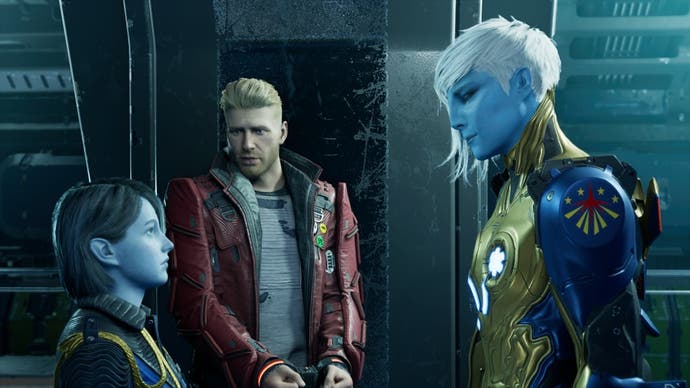
This brought the conversation round to the rather poignant final scenes of the game, where players see Star-Lord conversing with himself in his bedroom mirror, giving himself a pep talk about his future with the Guardians. However, this scene almost didn't make it into the final cut of the game.
"We were stretched thin, and we were in full production and struggling with some scenes," said Dugas.
"Some people were coming to me saying 'we have to cut that scene; you have to cut that scene.' But I said 'no, we cannot cut that scene. It needs to be there. It encapsulates everything we need it to'.
"In the end, that scene is the best wrap up, so I stuck to it, and I fought for it," Dugas said.
It is not just Star-Lord who sees emotional growth throughout the events of the game. Gamora reveals she is suffering from depression, while Rocket opens up about his experiences being experimented on. Similarly, Drax discusses how his wife and child were killed by Thanos. But many of the scenes revealing more of these backstories can be easily missed on any given playthrough.
One such scene plays out between Peter Quill and Drax. The duo can have an emotional conversation at the Rift, where they discuss their loved ones and where they may have gone after their deaths.
"Thinking of [his mother] there in Heaven, it got me halfway through the War," says Peter Quill.
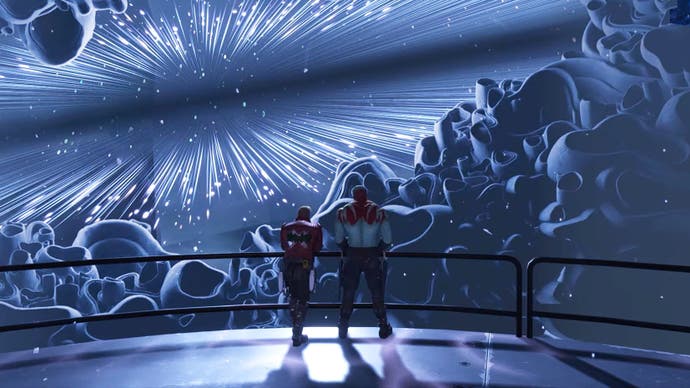
DeMarle hoped players tried to seek this scene out to see more humanity in the game's characters, as well as a scene where Gamora is meditating with her dolls which is filled with unexpected humour and the subject of later callbacks tucked elsewhere in the game's narrative.
And what of Gamora? Well, unlike her MCU counterpart, the Marvel's Guardians of the Galaxy team made a very conscious decision to steer her character away from the trope of just being a "love interest" on the side.
One reason for this was to ensure the story between Peter Quill, Ko-Rel and Nikki had the impact required to ensure the theme of family ran through the story, but another reason was to not distract from Gamora as a character in her own right.
"She's the only woman on the team - [so] do we have to always make the only woman on the team be 'The One'?" DeMarle said.
"I think, [a love story] would have detracted from Gomora as a character. We struggled for a while to really get the right balance for Gamora, and to build her arc and story [within the game], because she is a closed character. But we still really wanted her to be every bit a part of the team as everyone else."
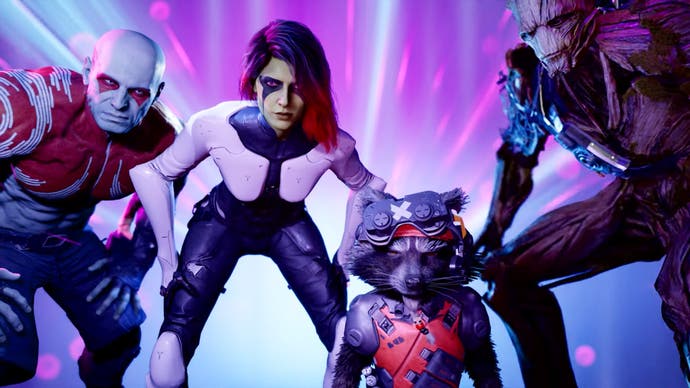
Speaking of big parts of the team, the smallest (at least in stature) member of the Guardians also deserves a mention: Rocket, the brilliant but volatile engineer (who is definitely not a racoon). Rocket actor Alex Weiner told me he worked hard to bring an animalistic quality to his portrayal of Rocket, but never let it override his character's emotional quality.
"He was experimented on and he's very, very different," Weiner said. "So, in terms of emotionality, you could play him as a human, but I made a decision to imbue him with those animalistic qualities... that was something I wanted to do.
"Sometimes you'll notice a little scratching, in the voice you'll notice the teeth getting in... it came from the intensity of his backstory and it came from his trauma. Our director gave me the freedom to play with that... I'm not going to say I researched raccoons, but I have an idea of what they're like."
Weiner certainly does have an idea of what racoons are like, as just days before flying over to the UK for the BAFTAs, he faced an unexpected skirmish with the fox-faced mammal.
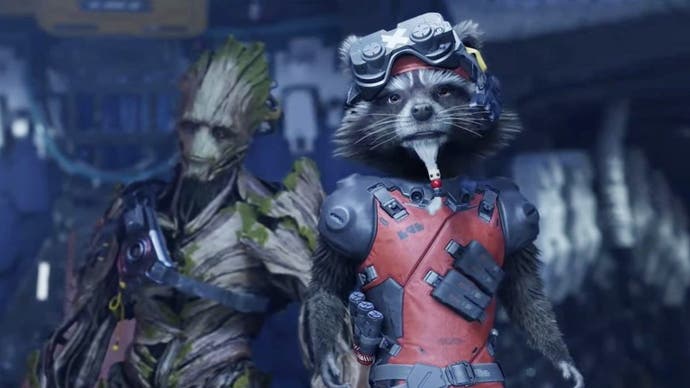
"You know, what's funny is I had to fight a raccoon, literally," Weiner recalled, amused by his situation.
"I ordered UberEATS and they left it for me by the door. So, I went outside and there was a raccoon eating it. I literally had a tug of war with the raccoon, and it just opened the bag, grabbed two burgers and ran away! I just had to say, 'that's fine', like good for him."
Don't believe him? Well Star-Lord has the pictures to prove it.
"It's true! He sent me photos," McLaren laughed.
Whatever the future may hold for Guardians of the Galaxy, it is clear that the team has a strong bond that extends beyond the confines of the Milano.
